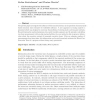Free Online Productivity Tools
i2Speak
i2Symbol
i2OCR
iTex2Img
iWeb2Print
iWeb2Shot
i2Type
iPdf2Split
iPdf2Merge
i2Bopomofo
i2Arabic
i2Style
i2Image
i2PDF
iLatex2Rtf
Sci2ools
128
click to vote
WCET
2010
2010
On the Use of Context Information for Precise Measurement-Based Execution Time Estimation
The present paper investigates the influence of the execution history on the precision of measurementbased execution time estimates for embedded software. A new approach to timing analysis is presented which was designed to overcome the problems of existing static and dynamic methods. By partitioning the analyzed programs into easily traceable segments and by precisely controlling run-time measurements with on-chip tracing facilities, the new method is able to preserve information about the execution context of measured execution times. After an adequate number of measurements have been taken, this information can be used to precisely estimate the Worst-Case Execution Time of a program without being overly pessimistic. Digital Object Identifier 10.4230/OASIcs.WCET.2010.64
Execution Time | On-chip Tracing Facilities | Software Engineering | WCET 2010 | Worst-case Execution Time |
Related Content
| Added | 15 Feb 2011 |
| Updated | 15 Feb 2011 |
| Type | Journal |
| Year | 2010 |
| Where | WCET |
| Authors | Stefan Stattelmann, Florian Martin |
Comments (0)

